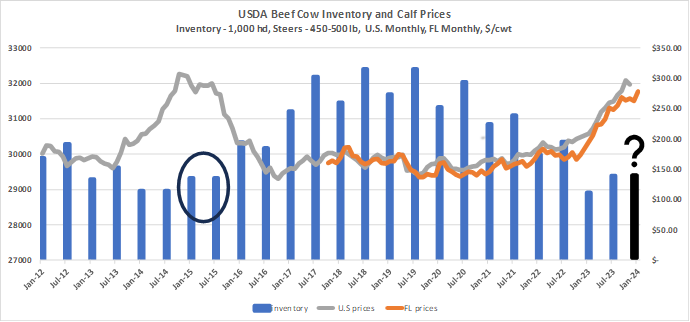2024: A Year of Stabilizing, Expanding, or Both?
On January 31st, 2024, USDA will release the bi-annual Cattle Inventory Report. We can expect to see that inventory will be low, much like we saw in 2014 and 2015, due to prolonged drought, high input costs and interest rates, and limited forage. How low will it be is the question. Has inventory stabilized? Or has inventory dropped even lower because of continued liquidation throughout 2023?
Based on other reports, such as Cattle on Feed and Livestock Slaughter, we can draw a “pre-report” conclusion that at the very least, the herd has tried to stabilize. As of January 2024, the number of heifers on feed is 39.7 percent of all cattle on feed, and is unchanged from a year ago. This is 5.4 percent higher than January of 2015, which was the year of the last expansion, indicating this expansion will be a much slower process. Female cattle slaughter (beef cows, heifers, and dairy cows), as of December 2023, was 53.4 percent of all cattle slaughter. Beef cow slaughter, which can also be assumed as the culling rate, was 12.7 percent of all cattle slaughter. To put that number in perspective, the culling rate averaged at about 8 percent during the last expansion. This is a brief summary of the state of the cattle market. Visit the website listed below for the “January Bi-Annual Report” that will cover the cattle market in more detail after the inventory report is released on the 31st.
–
Thinking Economically in the Everyday Tasks
The year 2024 will look different for each operation. Decisions should be based on forage availability and financial stability and after assessing any risks. Some operations may be able to start expanding by retaining heifers or even purchasing cattle in an effort to have a larger calf crop in 2024 and 2025 and take advantage of prolonged higher prices. Other operations may use this year as a year of regrouping and investing in new management strategies while prices are favorable and providing extra revenue. When making these decisions, always consider the short-term and long-term outcomes.
–
For questions, contact Hannah at h.baker@ufl.edu
See this update and other helpful resources online at https://rcrec-ona.ifas.ufl.edu/about/directory/staff/hannah-baker/
- The Value of Reproductive Efficiency when Rebuilding Your Cattle Herd - June 20, 2025
- May 2025 Florida Cattle Market Update – Livestock Slaughter & Beef Production - June 6, 2025
- April 2025 Florida Cattle Market Update - May 2, 2025


